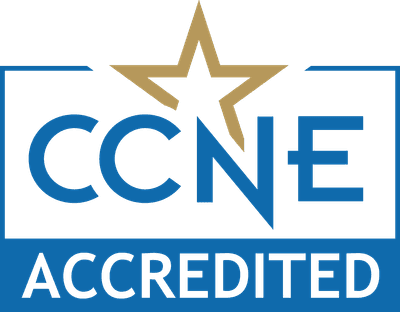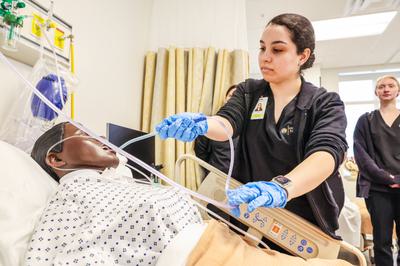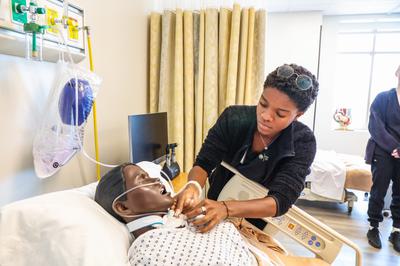Health Sciences
Nursing Degree Program
Nurses care. Nurses heal. Nurses listen. Nurses are there when we’re at our most vulnerable—when we’re sick and scared and unsure what to do next.
But that’s just the beginning. Nurses teach entire communities how to protect their health. They conduct medical research. They shape healthcare policy. They run hospitals, nonprofit organizations, and clinics. They advocate for their patients and their patients’ rights.
Nurses do everything they’re called to do. And at Texas Lutheran University, nurses begin their journey toward changing the world.

The baccalaureate degree program in nursing and master's degree program in nursing at Texas Lutheran University is accredited by the Commission on Collegiate Nursing Education (http://www.ccneaccreditation.org).

Explore our Nursing Options at TLU:
Learn More
-
Applying to TLU's Traditional Nursing Program
- Apply and gain admission to TLU at apply.tlu.edu/apply.
- Complete prerequisite courses prior to entry into the Nursing Program.
- Complete the TLU Nursing application. Go to apply.tlu.edu/apply, start a new application, select the year you are applying for, and select “Nursing” on the second drop-down option.
- Provide three reference evaluation forms completed by health care supervisors or faculty who are familiar with your performance.
- Earn at least a “C” in each prerequisite course with an overall minimum 3.0 prerequisite GPA on a 4.0 scale. All science courses must be completed within the last seven years prior to the application deadline.
- Earn an overall score of 70% or higher on all sections of the TEAS® (Test for Essential Academic Skills) exam within the last 12 months.
- Prior to beginning the program, admitted students must complete health requirements, including the Texas Board of Nursing Mandatory Background Check and Drug Screening. If you are a current TLU student, you can apply to the Nursing Program at apply.tlu.edu/apply, start a new application, select the year you are applying for, and select “Nursing” on the second drop-down option.
Fall Nursing Application Deadlines: Priority Deadline is January 30 and Late Decision Deadline is March 31
Spring Nursing Application Deadlines: Priority Deadline is August 15 and Late Decision Deadline is October 31
-
Nursing Prerequisites
General Education Courses (33 credit hours to include)
- COMP 131 English Composition I (3 credit hours)
- COMP 132 English Composition II (3 credit hours)
- FREX 134 Exploring the Arts and Sciences (3 credit hours)
- MATH 133 College Algebra (3 credit hours)
- THEO 133 Introduction to Theology (3 credit hours)
- SPAN 131 Spanish Language and Culture I (3 credit hours)
- HUMANITIES electives (6 credit hours)
- ARTS electives (3 credit hours)
Supporting Courses/Prerequisites (40 credit hours to include)
- BIOL 245 Human Anatomy and Physiology I (4 credit hours)
- BIOL 246 Human Anatomy and Physiology II (4 credit hours)
- BIOL 233 Pathophysiology (3 credit hours)
- BIOL 235 Principles of Nutrition (3 credit hours)
- BIOL 242 Microbiology (4 credit hours)
- CHEM 147 Principles of Chemistry (4 credit hours)
- PSYC 131 Intro to Psychology (3 credit hours)
- PSYC 236 Developmental Psychology (3 credit hours)
- COMM 374 Professional Speaking (3 credit hours)
- SOCI 130 Introduction to Sociology (3 credit hours)
- STAT 374 Statistics (3 credit hours)
-
Nursing Program Plan Of Study
Nursing Courses Plan of Study (60 credit hours to include)
Semester 1 (14 credit hours)
- NURS 330 Age-Span Bio-Psycho-Social-Spiritual Assessment (4 credit hours)
- NURS 332 Fundamental Nursing Concepts & Practice (5 credit hours)
- NURS 334 Evidence-Based Professional Nursing I (3 credit hours)
- NURS 336 Health Care in 21st Century (2 credit hours)
Semester 2 (17 credit hours)
- NURS 340 Complex Nursing Concepts & Practice I (7 credit hours)
- NURS 342 Behavioral Health/Psychiatric Nursing (5 credit hours)
- NURS 344 Nursing Research for Evidence-Based Practice(3 credit hours)
- NURS 479 Special Topics (2 credit hours)
Semester 3 (15 credit hours)
- NURS 430 Nursing of Childbearing Families (5 credit hours)
- NURS 432 Complex Nursing Concepts & Practice II (7 credit hours)
- NURS 434 Leadership & Management of Nursing Care (3 credit hours)
Semester 4 (14 credit hours)
- NURS 440 Community Health Nursing (5 credit hours)
- NURS 442 Evidence-Based Professional Nursing II (3 credit hours)
- NURS 443 Capstone - Nursing Leadership Practicum (6 credit hours)
-
ATI TEAS Exam Information
What is the TEAS® Exam?
The Test of Essential Academic Skills (TEAS) by ATI is used by many nursing programs to determine an applicant’s readiness for admission. The exam consists of academic content in general college coursework. The applicant must enroll and take the examination during the exam window. A minimum score of proficient is required for admission into the nursing program. Tests sections include reading comprehension, grammar, vocabulary, mathematics, biology, chemistry, anatomy and physiology.
ATI – the creator of the ATI TEAS Exam - is partnering with Proctorio to virtually proctor the TEAS Exam, allowing you to take it from nearly anywhere with a strong internet connection. Proctorio is a remote proctoring platform that uses machine learning to proctor students from wherever they may be. The remote proctored ATI TEAS Exam offers a variety of secure exam settings including video, audio, and screen recording designed to maintain the integrity of the assessment and ensure un-compromised exam results.
Please visit www.atitesting.com to view available dates and register for the TEAS.
-
Scholarships & Financial Aid
We offer generous academic scholarships for transfer students who plan to enroll as full-time students. Our scholarships are awarded based on cumulative GPA from all institutions attended. Students who hold a bachelor’s degree are not eligible for TLU scholarships and institutional aid.
Students who are members of Phi Theta Kappa at a community college are eligible to receive $3,000 per year on top of any TLU academic scholarship.
Renewal of transfer academic scholarships is based on continued full-time enrollment and the cumulative 2.00 GPA earned at TLU. All transfer scholarships are renewable for six semesters.
OTHER SCHOLARSHIPS AND GRANTS
You may be eligible for additional scholarships or grants offered through the TLU Nursing Program. Contact Student Financial Services at studentfinancialservices@tlu.edu or 830-372-8010 for more information.
-
Accelerated Transfer Nursing Program
If you are interested in TLU's Accelerated Transfer Nursing Program, please refer to the page below for more information.
-
Board of Nursing Licensure Requirements
Board of Nursing Licensure Requirements TLU Nursing Public Disclosure Last Updated: 11/21/2025
TLU- Traditional BSN TLU-Accelerated BSN TLU-Accelerated BSN TLU-Direct Entry MSN TLU-Direct Entry MSN Seguin New Braunfels Houston New Braunfels Houston State Bachelor of Science in Nursing Accelerated Bachelor of Science in Nursing Bachelor of Science in Nursing Master of Science in Nursing Master of Science in Nursing Alabama Meets Requirements Meets Requirements Meets Requirements Meets Requirements Meets Requirements Alaska Meets Requirements Meets Requirements Meets Requirements Meets Requirements Meets Requirements Arizona Meets Requirements Meets Requirements Meets Requirements Meets Requirements Meets Requirements Arkansas Meets Requirements Meets Requirements Meets Requirements Meets Requirements Meets Requirements California Meets Requirements Meets Requirements Meets Requirements Meets Requirements Meets Requirements Colorado Meets Requirements Meets Requirements Meets Requirements Meets Requirements Meets Requirements Connecticut Meets Requirements Meets Requirements Meets Requirements Meets Requirements Meets Requirements Delaware Meets Requirements Meets Requirements Meets Requirements Meets Requirements Meets Requirements District of Columbia Meets Requirements Meets Requirements Meets Requirements Meets Requirements Meets Requirements Florida Meets Requirements Meets Requirements Meets Requirements Meets Requirements Meets Requirements Georgia Meets Requirements Meets Requirements Meets Requirements Meets Requirements Meets Requirements Hawaii Meets Requirements Meets Requirements Meets Requirements Meets Requirements Meets Requirements Idaho Meets Requirements Meets Requirements Meets Requirements Meets Requirements Meets Requirements Illinois Meets Requirements Meets Requirements Meets Requirements Meets Requirements Meets Requirements Indiana Meets Requirements Meets Requirements Meets Requirements Meets Requirements Meets Requirements Iowa Meets Requirements Meets Requirements Meets Requirements Meets Requirements Meets Requirements Kansas Meets Requirements Meets Requirements Meets Requirements Meets Requirements Meets Requirements Kentucky Meets Requirements Meets Requirements Meets Requirements Meets Requirements Meets Requirements Louisiana Meets Requirements Meets Requirements Meets Requirements Meets Requirements Meets Requirements Maine Meets Requirements Meets Requirements Meets Requirements Meets Requirements Meets Requirements Maryland Meets Requirements Meets Requirements Meets Requirements Meets Requirements Meets Requirements Massachusetts Meets Requirements Meets Requirements Meets Requirements Meets Requirements Meets Requirements Michigan Meets Requirements Meets Requirements Meets Requirements Meets Requirements Meets Requirements Minnesota Meets Requirements Meets Requirements Meets Requirements Meets Requirements Meets Requirements Mississippi Meets Requirements Meets Requirements Meets Requirements Meets Requirements Meets Requirements Missouri Meets Requirements Meets Requirements Meets Requirements Meets Requirements Meets Requirements Montana Meets Requirements Meets Requirements Meets Requirements Meets Requirements Meets Requirements Nebraska Meets Requirements Meets Requirements Meets Requirements Meets Requirements Meets Requirements Nevada Meets Requirements Meets Requirements Meets Requirements Meets Requirements Meets Requirements New Hampshire Meets Requirements Meets Requirements Meets Requirements Meets Requirements Meets Requirements New Jersey Meets Requirements Meets Requirements Meets Requirements Meets Requirements Meets Requirements New Mexico Meets Requirements Meets Requirements Meets Requirements Meets Requirements Meets Requirements New York Meets Requirements Meets Requirements Meets Requirements Meets Requirements Meets Requirements North Carolina Meets Requirements Meets Requirements Meets Requirements Meets Requirements Meets Requirements North Dakota Meets Requirements Meets Requirements Meets Requirements Meets Requirements Meets Requirements Ohio Meets Requirements Meets Requirements Meets Requirements Meets Requirements Meets Requirements Oklahoma Meets Requirements Meets Requirements Meets Requirements Meets Requirements Meets Requirements Oregon Meets Requirements Meets Requirements Meets Requirements Meets Requirements Meets Requirements Pennsylvania Meets Requirements Meets Requirements Meets Requirements Meets Requirements Meets Requirements Rhode Island Meets Requirements Meets Requirements Meets Requirements Meets Requirements Meets Requirements South Carolina Meets Requirements Meets Requirements Meets Requirements Meets Requirements Meets Requirements South Dakota Meets Requirements Meets Requirements Meets Requirements Meets Requirements Meets Requirements Tennessee Meets Requirements Meets Requirements Meets Requirements Meets Requirements Meets Requirements Texas Meets Requirements Meets Requirements Meets Requirements Meets Requirements Meets Requirements Utah Meets Requirements Meets Requirements Meets Requirements Meets Requirements Meets Requirements Vermont Meets Requirements Meets Requirements Meets Requirements Meets Requirements Meets Requirements Virginia Meets Requirements Meets Requirements Meets Requirements Meets Requirements Meets Requirements Washington Meets Requirements Meets Requirements Meets Requirements Meets Requirements Meets Requirements West Virginia Meets Requirements Meets Requirements Meets Requirements Meets Requirements Meets Requirements Wisconsin Meets Requirements Meets Requirements Meets Requirements Meets Requirements Meets Requirements Wyoming Meets Requirements Meets Requirements Meets Requirements Meets Requirements Meets Requirements
TLU Nursing by the Numbers

What to Expect as a TLU Nursing Student
Most of your nursing education happens during your junior and senior years—i.e., the 60 credit hours that constitute the BSN program. Here’s what makes earning your nursing degree at TLU unique.
Small Class Size
Our nursing classes are as small as possible. With an average class size of 30, you’ll get more hands-on experience in the field and more one-on-one time with our faculty.
Even Smaller Clinical Groups
You will be assigned to a clinical group of 6-10 fellow nursing students. With clinical groups this small, you’ll have more direct interaction with your instructors.
State-of-the-Art Facilities
Nursing is constantly evolving. That’s why you’ll practice your skills in TLU’s modern, cutting-edge simulation labs—allowing you to step immediately into your career upon graduation.
Real-World Experience
We believe in hands-on learning. And because TLU sits in the middle of one of the country’s fastest-growing regions, you’ll have the opportunity to study in hospitals and clinics across Central Texas. Our students complete their clinicals at top health care providers in Comal, Bexar, and Guadalupe counties with hospitals like Christus Santa Rosa, Methodist Hospital, University Hospital, Resolute New Braunfels, and Guadalupe Regional Medical Center.
Career Ready at Graduation
More than 90 percent of TLU nursing students pass the NCLEX-RN exam on the first attempt, and more than 95% are employed within six months of graduation. Since 2016, TLU's Cumulative NCLEX pass rate is 92% and the 2021 NCLEX pass rates for 2021 are 91.67%, putting TLU in the top 30% of reporting universities in Texas. More than 95% of students are employed at graduation and the program offers numerous internship and residency opportunities for senior nursing students or graduates.
Research
Every student at TLU can choose to work with a professor to conduct undergraduate research. As a nursing student, you’ll have the chance to explore—and even transform—critical issues in healthcare and medicine.
Accreditation
The nursing program at Texas Lutheran University is approved by the Texas Board of Nursing and accredited by the Commission on Collegiate Nursing Education. Our nursing graduates are poised to move quickly into their careers after graduation.
Careers in Nursing
There are dozens of careers in the nursing field. Here are a few of the most common and in-demand careers you can pursue when you graduate from TLU.
-
Registered Nurse (RN)
Registered nurses work alongside physicians, often in hospitals, clinics, and private medical offices. RNs conduct a wide range of important tasks—including administering medication and therapies, monitoring patient progress, and educating patients and their families. When you think of a “nurse,” you most often think of registered nurses.
-
Travel Nurse
This fast-growing profession offers nurses the chance to deliver care to patients across the world, moving to a new opportunity every few weeks or years. Travel nurses do many of the same tasks as registered nurses while exploring the globe.
-
Emergency Room Nurse
The perfect job for people who excel under pressure, emergency room nursing means dealing with patients experiencing trauma. ER nurses bring expertise and calm to the scene—stabilizing patients and helping save lives.
-
Home Health Nurse
Home health nurses are in growing demand. As the population ages, these nurses will be on the front lines of ensuring that patients can be cared for at home—often in long-term settings. They’ll help people live happier, healthier, longer lives.
-
Pediatric Nurses
Pediatric nurses work with infants, children, and adolescents, usually in a clinic or hospital. Pediatric nurses often combine the skills of a registered nurse with the compassion of a loved one. This is the perfect field for anyone who loves children.
